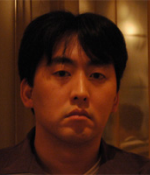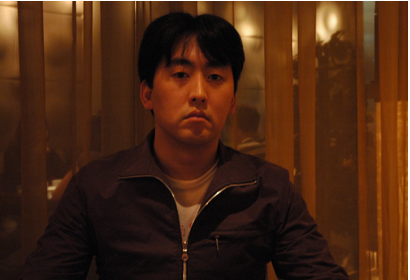Breakbeat Alternative: A Conversation with Riow Arai |
|

In November of 1996, on the 10th Anniversary of his debut, his seventh album, "SURVIVAL SEVEN," was released on the Libyus Music label. This month, "RIOW ARAI+NONGENETIC" will be printed by mass.mvmnt, a US-based label. We got in touch with Riow to learn more about his history and thoughts on breakbeat, techno, and Square.
Square Haven: Hello, Riow Arai. Thank you for taking the time to talk with us at Square Haven.
Riow Arai: Thank you. I hope it's an interesting conversation.
Haven: We have read that from the time you were a teenager you were making music with a synthesizer. What were some of your goals as a young musician, and what were your views of the Tokyo music scene?
Riow: I listened to Yellow Magic Orchestra when I was a child, and it had a tremendous impact. I bought a synthesizer, expressly for the purpose of making such music. At that time, the word "Techno Pop" had come into use, because in Japan there was Y.M.O., New Wave and Punk. They all became popular around the same time, largely among young people. Still, I think people using synthesizers to make music were few in number, though there were a lot of people interested in rock music buying guitars in Japan. It was the first half of the 1980's.
Riow Arai performs breakbeat and techno music
at nightclubs in Japan and produces his own albums
at nightclubs in Japan and produces his own albums
Haven: When you published your first album in 1996, "Again" on Frogman Records, you established a new genre called "Listening Techno." Can you tell us more about listening techno?
Riow: I was listening to a lot of dance music around that time and I wanted to make something that didn't make you want to dance violently. I was thinking of something more ambient, like The Orb, Autechre, Black Dog, etc. When it came time to classify my music, because it favored listening over dancing, inevitably it became known as "listening techno."
Haven: Your experience has provided you with plenty of chances to perform live in nightclubs. Is it different than recording in the studio?
Riow: The difference is--oneself is disclosed. Still, I don't find it difficult to play my tunes in the presence of others. When creating, there is a tension in the air that cannot be obtained in the studio. Often when am able to see people's reactions while my music is being played, I wonder who made them feel that way.
Haven: There is a wide variety of sounds that appear in your samples. How is it decided which ones work well together?
Riow: What you choose, what you like, what composition can come from it: these are important considerations for making music. However, there is no clear answer. It is dependent upon the sense of the individual musician.
Haven: How did it come about that you were selected to be the composer of the Front Mission Alternative soundtrack?
Riow: The director of Front Mission Alternative wanted to have people other than the composers working for Square making the music. By chance, I had a friend on the staff of Front Mission Alternative. He felt the music I was making would be suitable for the project. That was how it came about that I met the director, Masanori Hara.
When it came time to make the music, Hara left everything to me. This was wonderful, because I was concerned I might be embarrassed for not sounding like a game music composer. The program that converted my soundtrack sequence into data for the game was installed by Junya Nakano.
Haven: What were some of your goals in composing the Front Mission Alternative soundtrack?
Riow: I was making Listening Techno, and it was challenging the simple, even rhythm of techno dance tracks. With Front Mission Alternative, listening techno was most suitable because the game takes place on the battlefield instead of the dance floor. I tried for Drumn 'Bass in action scenes, and Listening Techno to establish the various settings. As a consequence, the completed score ended up balanced.
Haven: How did it come about that you began working together with rapper Nongenetic?
Haven: It started with my uploading an mp3 beat track to my website. Nongenetic rapped to the tune and sent the response to me by mail. I replied. That was how the collaboration started. It was all done through the net.
Truth be told, I wouldn't mind seeing my work enter more into the international market. I want to collaborate with people outside Japan if in the future there is a chance like this.
Haven: It was fascinating to have this chance to talk with you about your music, Riow. Thank you for sharing your time with us at Square Haven.
Riow: Thank you for taking an interest.
The composer of "SURVIVAL SEVEN" has survived
seven albums and a stint with Square
seven albums and a stint with Square
Interview conducted by jeriaska. To learn more about Riow Arai, visit his official website RiowArai.com.
Copyright © 1998-2025 Square Haven. This material may not be published or rewritten without crediting Square Haven as the author. Terms of Use




